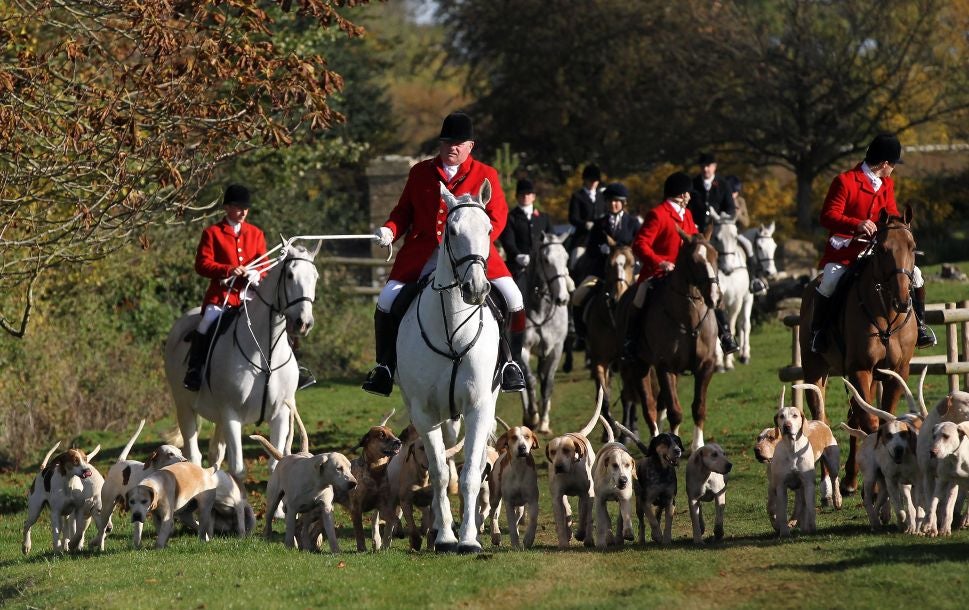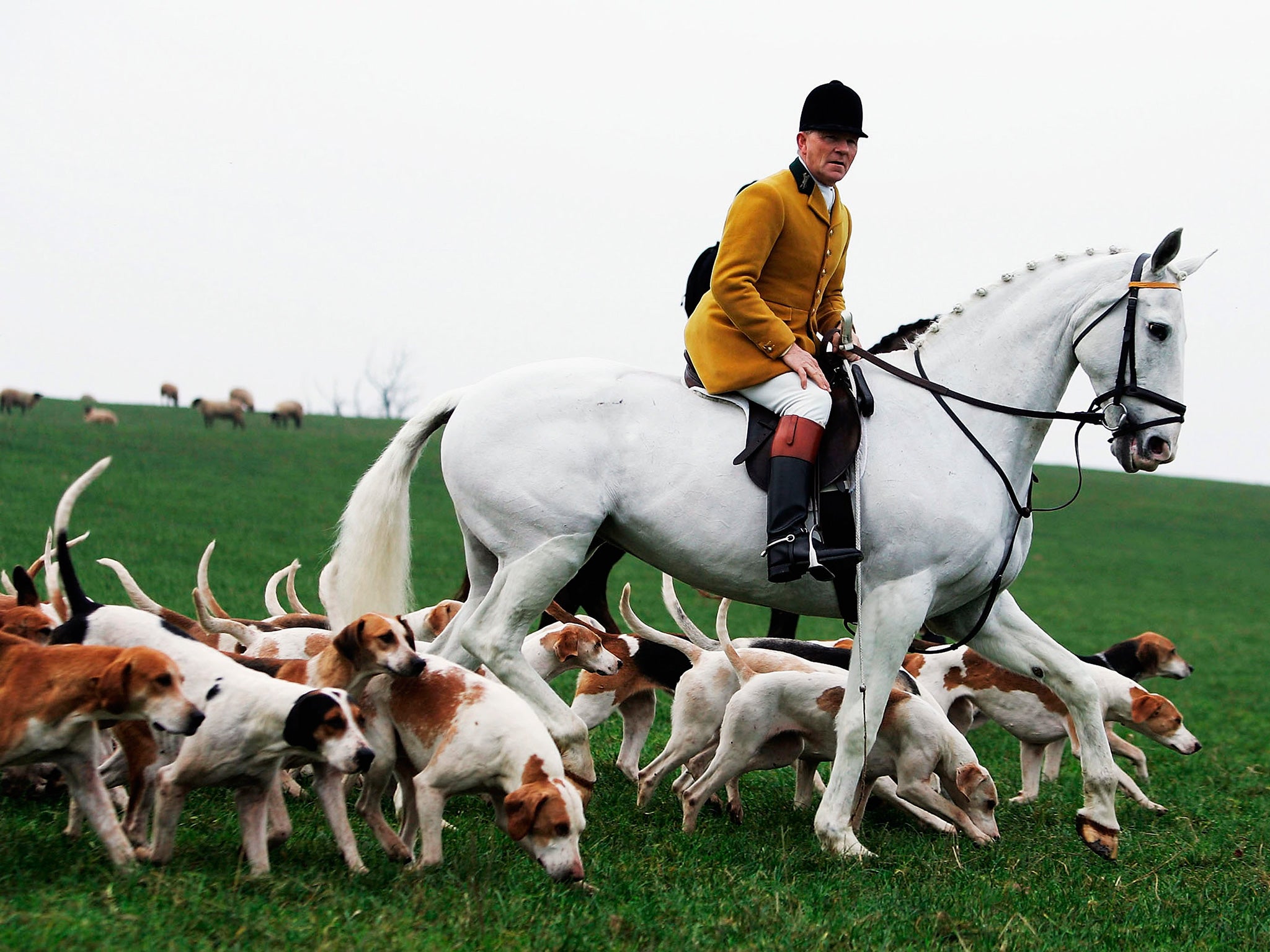Hunting ban: David Cameron to propose 'middle way' to limit outcry over animal welfare
Pro-hunting groups are believed to be open to a compromise option

Your support helps us to tell the story
From reproductive rights to climate change to Big Tech, The Independent is on the ground when the story is developing. Whether it's investigating the financials of Elon Musk's pro-Trump PAC or producing our latest documentary, 'The A Word', which shines a light on the American women fighting for reproductive rights, we know how important it is to parse out the facts from the messaging.
At such a critical moment in US history, we need reporters on the ground. Your donation allows us to keep sending journalists to speak to both sides of the story.
The Independent is trusted by Americans across the entire political spectrum. And unlike many other quality news outlets, we choose not to lock Americans out of our reporting and analysis with paywalls. We believe quality journalism should be available to everyone, paid for by those who can afford it.
Your support makes all the difference.David Cameron is considering a “middle way” option to the controversial planned repeal of the hunting ban in a bid to limit public outcry over animal welfare, it has emerged.
A bill to axe the 2004 Hunting Act will not be in this week’s Queen’s Speech but legislation is expected before Christmas. While the new laws would allow hunting to resume, under consideration is a compromise that would protect foxes and other wild animals from “unnecessary cruelty”. Other options on the table are licensing or tougher regulation of hunting than existed before the ban came into force in 2005.
The Prime Minister is understood to be considering a compromise package because of the huge support among voters for the original ban. It is possible that the Queen, in her 62nd address to Parliament on Wednesday, will allude to a free vote on hunting within the year. A number of Conservative MPs stood at the general election with the backing of Vote-OK, a pro-hunting umbrella group, on the promise that they would vote for repeal in the Commons. Yet animal welfare campaigners are alarmed at the prospect of repeal of the 2004 act, which was hugely popular among voters.

Pro-hunting groups are believed to be open to a compromise option, as they were more than a decade ago when the issue was debated at length in the Commons and Lords. The first is the “Donoughue option”, named after the former Labour minister Lord Donoughue, who originally proposed a middle way to reconcile strong feelings on either side of Parliament. This would involve outlawing “deliberate and unnecessary cruelty” to wild animals, which would ban digging out fox cubs from dens, but would still permit hunting.
A separate compromise, which would also be supported by pro-hunting groups, would be for hunting to return but be more closely regulated than it was before the outright ban – this was the original law envisaged by Alun Michael, the then rural affairs minister, in 2002.
Since the ban came into force a decade ago, hunting of foxes with dogs is banned but hunts are legally allowed to use hounds following an artificial scent. The Countryside Alliance and Vote-OK say that a repeal is needed to lift the threat of criminal prosecution from members of hunts where foxes are accidentally killed.
A Countryside Alliance source said: “We have always been open to a middle-way option if that would put the issue to bed. We have always been open to anything logical that isn’t just an illogical hatchet job.”
However animal welfare campaigners and many Labour MPs are unlikely to support a middle-way option and would want to block anything that waters down the ban.
The new legislative programme will also include a merging of adoption services, making it easier for children to be placed with families outside their local authority area.
The Prime Minister today announces that all government ministers will have their pay frozen for the entire parliament, a move that will save an estimated £800,000 per year, or £4m in total this parliament. While the figure is a small sum compared to the vast government budget, Mr Cameron said it underlined his government’s determination to cut the deficit and show “we are all in this together”.
The move means ministerial pay set by the Government will not have risen for a decade and a Cabinet minister’s total pay, including their MP’s salary, will remain at £134,565.
Mr Cameron said: “There are still difficult decisions to take as we complete the task of clearing the deficit. As we take those decisions, my approach is simple: we will do it in a one-nation way. We are all in this together: so I am freezing ministerial pay for the next five years.”
The Prime Minister is again expected to fail to include a long-promised bill that would speed up costly investigations of nurses who are the subject of public complaints. The Nursing and Midwifery Council (NMC) has argued that the legislation is vital if it is to control the cost of its nurse subscription fees, which has gone up from £100 to £120 this year. NMC chief executive Jackie Smith said: “I just think it would be devastating if this isn’t included and leaves us with the prospect of being unable to change anything – the quickest we can do this [an investigation and hearing process] is 15 months.
“We will continue to have 2,000 hearings a year at [a cost of] £13.5m, which is no good for the public or the profession. We face the prospect of years of more waiting on this.”
Join our commenting forum
Join thought-provoking conversations, follow other Independent readers and see their replies
Comments